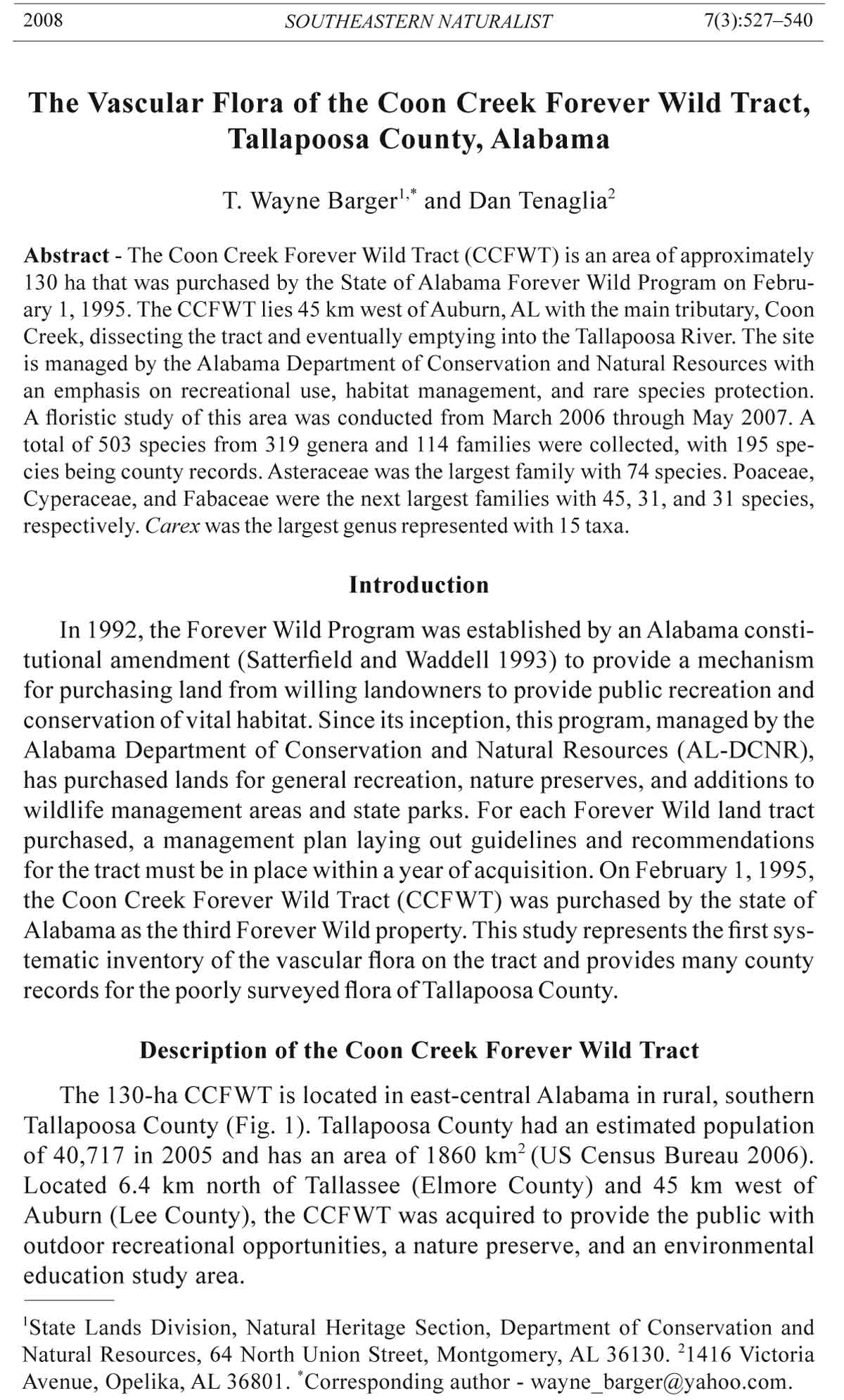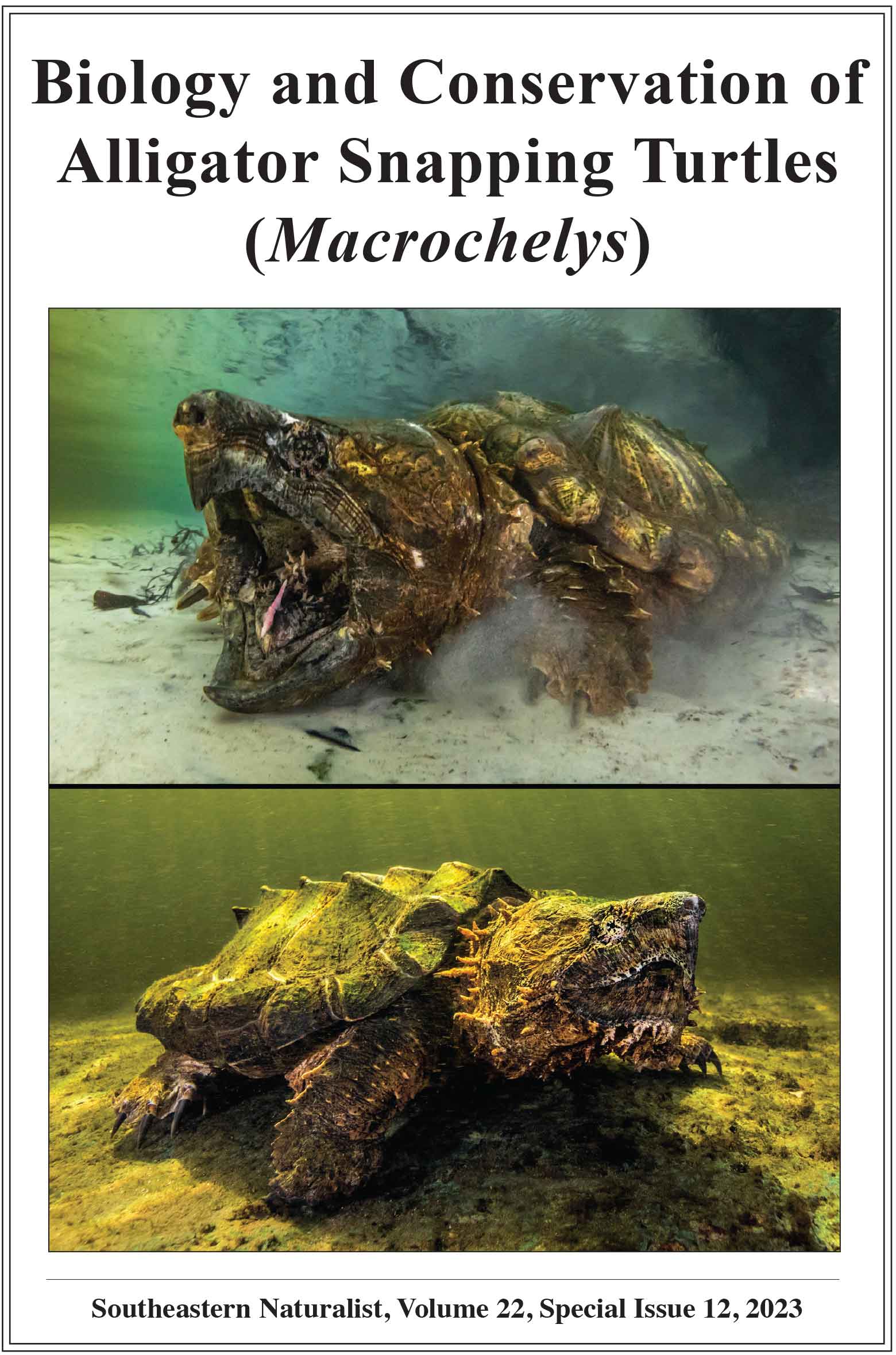2008 SOUTHEASTERN NATURALIST 7(3):527–540
The Vascular Flora of the Coon Creek Forever Wild Tract,
Tallapoosa County, Alabama
T. Wayne Barger1,* and Dan Tenaglia2
Abstract - The Coon Creek Forever Wild Tract (CCFWT) is an area of approximately
130 ha that was purchased by the State of Alabama Forever Wild Program on February
1, 1995. The CCFWT lies 45 km west of Auburn, AL with the main tributary, Coon
Creek, dissecting the tract and eventually emptying into the Tallapoosa River. The site
is managed by the Alabama Department of Conservation and Natural Resources with
an emphasis on recreational use, habitat management, and rare species protection.
A fl oristic study of this area was conducted from March 2006 through May 2007. A
total of 503 species from 319 genera and 114 families were collected, with 195 species
being county records. Asteraceae was the largest family with 74 species. Poaceae,
Cyperaceae, and Fabaceae were the next largest families with 45, 31, and 31 species,
respectively. Carex was the largest genus represented with 15 taxa.
Introduction
In 1992, the Forever Wild Program was established by an Alabama constitutional
amendment (Satterfield and Waddell 1993) to provide a mechanism
for purchasing land from willing landowners to provide public recreation and
conservation of vital habitat. Since its inception, this program, managed by the
Alabama Department of Conservation and Natural Resources (AL-DCNR),
has purchased lands for general recreation, nature preserves, and additions to
wildlife management areas and state parks. For each Forever Wild land tract
purchased, a management plan laying out guidelines and recommendations
for the tract must be in place within a year of acquisition. On February 1, 1995,
the Coon Creek Forever Wild Tract (CCFWT) was purchased by the state of
Alabama as the third Forever Wild property. This study represents the first systematic
inventory of the vascular fl ora on the tract and provides many county
records for the poorly surveyed fl ora of Tallapoosa County.
Description of the Coon Creek Forever Wild Tract
The 130-ha CCFWT is located in east-central Alabama in rural, southern
Tallapoosa County (Fig. 1). Tallapoosa County had an estimated population
of 40,717 in 2005 and has an area of 1860 km2 (US Census Bureau 2006).
Located 6.4 km north of Tallassee (Elmore County) and 45 km west of
Auburn (Lee County), the CCFWT was acquired to provide the public with
outdoor recreational opportunities, a nature preserve, and an environmental
education study area.
1State Lands Division, Natural Heritage Section, Department of Conservation and
Natural Resources, 64 North Union Street, Montgomery, AL 36130. 21416 Victoria
Avenue, Opelika, AL 36801. *Corresponding author - wayne_barger@yahoo.com.
528 Southeastern Naturalist Vol.7, No. 3
The CCFWT is located just east of the Tallapoosa River with Yates Dam
located 2.4 km to the south of the property. An old concrete boat ramp allowing
access to narrow Yates Lake through the southern edge of the property
is the only developed area on the site, with the exception of old woods roads
and a narrow paved road along the southern section of the property. The
northern portion of the study area can be accessed via a graded county dirt
road that runs along a portion of the northern boundary. When compared to
the surrounding area’s land use or other area lakes (such as Lake Martin),
Yates Lake is relatively isolated and there is little encroaching development.
This lack of development is partially due to the property having one mindful
land steward from 1961 until the time of its purchase by the state in 1995.
Though the CCFWT technically falls in the Piedmont (Southern Outer
Piedmont Ecoregion), the tract has many characteristics common to the
Coastal Plain (Fall Line Hills Ecoregion). The vegetation and terrain generally
consists of heavily wooded oak-hickory forest lands with rolling hills
sloping into and surrounding the mouth of Coon Creek. Elevation ranges
from 105 m to approximately 182 m above sea level, with slopes of near
15% present in places. The major soil association of the area is Gilead-
Norfolk-Greenville and is described as being comprised primarily of pacolet
Figure 1. Location of the Coon Creek Forever Wild Tract in Tallapoosa County, AL.
Yates Dam (not shown on the map) backs up the Tallapoosa River to create Yates Lake.
2008 T.W. Barger and D. Tenaglia 529
sandy loam surface soils with clay loam subsoil, and secondarily of sandy
surface soils and loamy sand subsoil (USDA NRCS 2007). The climate for
the area averages a July high of 33 oC and a January low of 1 oC; rainfall
for the area is approximately 134 cm (54 inches) per year, with March being
the wettest month and October being the driest (The Weather Channel 2007).
The number of frost-free days (growing season) averages 234.
Coon Creek is the main drainage through the CCFWT, fl owing east to
west, and eventually emptying into the Tallapoosa River. Several smaller
creeks also extend into the CCFWT’s boundary, each eventually emptying
in to Coon Creek. Backwater from Yates Lake covers approximately 9 ha of
the 130-ha tract, with approximately 4 additional hectares being marshland.
Classification of forested plant communities on the CCFWT in 1995 showed
the following community-type percentages: 17% upland pine, 31% mixed
pine/hardwood, 36% upland hardwood, 14% intermediate hardwood, and
2% bottomland hardwood (State Lands Division, Department of Conservation
and Natural Resources, Montgomery, AL, unpubl. data). This breakdown
accurately depicts the community types and percentages currently
present. Oak-hickory is the primary climax forest, with scattered Pinus taeda
L. (Loblolly Pine) being the predominant pine species. However, there is a
natural inclusion of P. palustris P. Mill (Longleaf Pine) on the north side of
the property.
Historical Land Use
Historically, land use of the CCFWT was documented to have supported
the turpentine industry that was once widespread across the longleaf forests of
the southeastern US. Longleaf Pines were the species typically utilized for sap
because of their plentifulness, long life span, prolific sap fl ow, and ability to
withstand injury. From the mid-1800s until the turn of the century, collection
of pine sap for use in conversion to turpentine or use in naval stores was a vast
industry. This natural resource was primarily derived from the Longleaf Pines
that covered the southeastern US, but sometimes also employed other species
such as Pinus elliottii Engelm. (Slash Pine). The discovery of a “catface” (the
name for the resulting marks made on pine trees in an effort to collect the sap)
and several turpentine collection pans indicate that Longleaf Pines may have
been more prevalent around the CCFWT than they are today.
Methods
The systematic collection within the CCFWT was conducted from March
2006 through May 2007. Methodology for surveying the study area was
performed utilizing a modified meandering method similar to that of Goff
et al. (1982). When possible, plants were collected in a non-destructive
(top-snatched) manner for plant populations that were sampled. Because of
the relatively small size of the CCFWT, the natural divisions of the property,
and the frequency of surveys, the entire tract was thoroughly sampled.
530 Southeastern Naturalist Vol.7, No. 3
Voucher specimens were collected and identified by the authors and subsequently
deposited at the Anniston Museum of Natural History, part of the
Jacksonville State University herbarium collections (JSU). Verifications
were made by the museum’s curator of collections, Dan Spaulding. Duplicates
were deposited at Troy Herbarium (TROY).
Identifications were determined using the following: Flora of the
Carolinas, Virginia, Georgia and Surrounding Areas – online working draft
version, August 9, 2006 (Weakley 2006); Manual of the Vascular Flora of
the Carolinas (Radford et al. 1968); Manual of the Grasses of the United
States. Volumes I and II (Hitchcock 1971); Guide to the Vascular Plants of
the Florida Panhandle (Clewell 1985); Aquatic and Wetland Plants of the
Southeastern United States. Monocotyledons (Godfrey and Wooten 1979);
and Aquatic and Wetland Plants of the Southeastern United States. Dicotyledons
(Godfrey and Wooten 1981).
Results and Discussion
Plant survey summary
A total of 503 species representing 319 genera and 114 families were
collected from the CCFWT. Of these, 195 were ascertained to be county
records for Tallapoosa County (Kartesz 2007). Asteraceae was the largest
family with 74 species. Poaceae, Cyperaceae, and Fabaceae were the next
largest families with 45, 31, and 31 species, respectively. Carex represented
the largest genus with 15 taxa. Flowering plants comprised 96% of the fl ora,
with dicots making up 72% and monocots comprising 24% (Appendix 1).
Ferns and allies accounted for another 3%, and conifers made up 1% of the
total vegetation sampled. Thirty-five species, or 7% of the species composition,
were introduced species to the fl ora. No members of Lycopodiophyta
were discovered during vegetation sampling.
Rare plant species
Three species of special interest were collected during this study. They
are: Matelea baldwyniana (Sweet) Woods. (Baldwin’s Milkvine), Croomia
paucifl ora (Nutt.) Torr. (Croomia), and Baptisia megacarpa Chapman ex
Torr. & Gray (Apalachicola Wild Indigo). These species are designated by
NatureServe as G3, G3, and G2, species respectively (NatureServe 2007).
The G3 designation indicates that a species is “vulnerable range-wide,” and
G2 indicates that a species is “imperiled range-wide.”
Matelea baldwyniana is a twining, perennial herbaceous vine that has
mostly heart-shaped leaves that are opposite in articulation. The fl owers are
approximately 1 cm wide with strongly to moderately twisted petals that
are creamy-white. Anthesis for this site was mid-April. This species is typically
found on dry to slightly mesic slopes over calcareous bluffs and was
once considered for listing as an endangered species. However, populations
were considered too abundant for this designation. Baldwin’s Milkvine was
historically found in four Alabama counties (Barbour, Clarke, Monroe, and
2008 T.W. Barger and D. Tenaglia 531
Wilcox), however each of those populations are considered extirpated (Mohr
1901). Ironically, Mohr (1901) recognized this taxon as being among the
rarest in the south. Verification of this species in Tallapoosa County marks a
state record for rediscovery of the species. Prior to this study, the plant was
only known in Missouri, Oklahoma, Arkansas, and two Florida counties.
Croomia paucifl ora is an herbaceous perennial member of the Stemonaceae,
which is comprised of four genera and approximately 35 species.
There are only 3 species of Croomia worldwide, with C. paucifl ora being
the sole species found within the US (Whetstone 1984). Currently, C.
paucifl ora has a limited distribution outside Alabama, occurring in only
one Louisiana parish, two Florida counties, and eight Georgia counties. In
Alabama, Croomia occurs in 25 counties, extending from the upper Coastal
Plain to Harper’s discovery in the lower Appalachians (Harper 1942). Found
mostly in moist, rich forests with common mesophytic forest indicators such
as Fagus grandifolia Ehrh. (Beech) and Tilia americana L. (Basswood),
anthesis for Croomia in our area is mid to late-April. Croomia was also once
a candidate species for federal listing under provisions of the Endangered
Species Act; however, listing was denied because the plant was found to be
too abundant in Alabama (Patrick et al. 1995).
In 1983, Kral noted Baptisia megacarpa as a “rare or threatened plant
species.” Occurring mostly in moist forest fl oodplains and lower wet slopes,
Apalachicola Wild Indigo is endemic to three Georgia counties, seven Florida
counties, and 10 Alabama counties. It is considered imperiled or critically
imperiled throughout its distribution and is regarded as being particularly
susceptible to disturbance (Nelson 2005). The present discovery is near the
northern limit for the distribution of the species, with only one known location
lying further north. Anthesis for B. megacarpa is early to mid-May for
this location. Relatively little information has been published regarding this
uncommon species.
Other species of interest, because of state or distributional rarity, included:
Agalinis tenella Pennell (Ten-lobe False Foxglove) G4; Celastrus
scandens L. (American Bittersweet) G5; Crataegus pulcherrima Ashe
(Beautiful Hawthorn) G3; Sida elliottii Torr. & Gray (Elliott’s Fanpetals)
G4; and Verbesina aristata (Ell.) Heller (Coastal-plain Crownbeard) G4.
Exotic plant species
Thirty-five non-native plant species were collected on the CCFWT. This
group accounts for approximately 7% of the total species observed. Other
regional fl oras have had slightly higher percentages of non-native plant species;
however, the areas surveyed were generally much larger than the 130
ha from the present study: 2528 ha of Lake Guntersville State Park yielded
17% non-natives (Spaulding 1999); 28,329 ha of Talladega Ranger District,
Talladega National Forest yielded 12% non-natives (Ballard 1995); and 1101
ha of Cheaha State Park yielded 10% non-natives (Bussey 1983). While this
study did not focus on quantitative measurements of plant coverage, the
observed land area covered by these non-native plants was relatively small.
532 Southeastern Naturalist Vol.7, No. 3
The most commonly encountered non-native plant species, in order of abundance,
were: Albizia julibrissin Durazzini (Mimosa), Microstegium vimineum
(Trin.) A. Camus (Japanese Stilt Grass), Lespedeza cuneata (Dumont)
G. Don (Chinese Lespedeza), Melia azederach L. (Chinaberry), Pueraria
montana (Lour.) Merr. (Kudzu), Wisteria sinensis (Sims) Sweet (Chinese
Wisteria), and the combined Trifolium spp.
Acknowledgments
The authors thank Curtis Hansen and the anonymous reviewers for their helpful
comments in crafting this manuscript. Numerous field assistants were also very helpful
in the collection of specimens for this project. Special thanks are extended to Dan
Spaulding for his gracious assistance with plant specimen identification and to John
Kartesz for verification of county record data.
Literature Cited
Ballard, J.M. 1995. A vascular fl ora of the Talladega Ranger District of the Talladega
National Forest, Alabama. M.Sc. Thesis. Jacksonville State University. 270 pp.
Bussey, M.G. 1983. Flora of Cheaha State Park, Alabama. M.Sc. Thesis. Jacksonville
State University. 90 pp.
Clewell, A.F. 1985. Guide to the Vascular Plants of the Florida Panhandle. University
Presses of Florida, Tallahassee, FL. 605 pp.
Godfrey, R.K., and J.W. Wooten. 1979. Aquatic and Wetland Plants of Southeastern
United States. Monocotyledons. The University of Georgia Press, Athens, GA.
712 pp.
Godfrey, R.K., and J.W. Wooten. 1981. Aquatic and Wetland Plants of Southeastern
United States. Dicotyledons. The University of Georgia Press, Athens, GA. 933
pp.
Goff, F.G., G.A. Dawson, and J.J. Rochow. 1982. Site examination for threatened
and endangered plant species. Environmental Management 6:307–316.
Harper, R.M. 1942. Croomia: A member of the Appalachian fl ora. Castanea 7:109–
113.
Hitchcock, A.S. 1971. Manual of the Grasses of the United States. Volumes I and II.
Dover Publications, Inc., New York, NY. 1051 pp.
Kartesz, J.T. 1994. A Synonymized Checklist of the Vascular Flora of the United
States, Canada, and Greenland, 2nd Edition, Volume 1. Timber Press, Portland,
OR. 622 pp.
Kartesz, J.T. 2007. Draft of a synonymized checklist and atlas with biological attributes
for the vascular fl ora of the United States, Canada, and Greenland. Second
Edition. In J.T. Kartesz (Ed.). Floristic Synthesis of the North American Flora,
Version 1.0. Unpublished draft.
Kral, R. 1983. Fabaceae. Pp. 617–680, In A report on some rare, threatened, or endangered
forest-related vascular plants of the south. Vol. 1, T.P. RB-TP2. USDAForest
Service, Atlanta, GA.
Mohr, C.T. 1901. Plant Life of Alabama. Geological Survey of Alabama. Government
Printing Office, Washington, DC.
NatureServe. 2007. NatureServe Explorer: An online encyclopedia of life [web application].
Version 6.1. NatureServe, Arlington, VA. Available online at http://
www.natureserve.org/explorer. Accessed August 20, 2007.
2008 T.W. Barger and D. Tenaglia 533
Nelson, G. 2005. East Gulf Coast Coastal Plain Wildfl owers. Globe Pequot Press,
Guilford, CT. 264 pp.
Patrick, T.S., J.R. Allison, and G.A. Krakow. 1995. Protected Plants of Georgia.
Georgia Natural Heritage Program. Georgia Department of Natural Resources.
Social Circle, GA. 246 pp.
Radford, A.E., H.E. Ahles, and C.R. Bell. 1968. Manual of the Vascular Flora of the
Carolinas. University of North Carolina Press, Chapel Hill, NC. 1183 pp.
Satterfield, W.H., and G.G. Waddell. 1993. A history and analysis of Alabama’s “Forever
Wild” constitutional amendment. Alabama Law Review 44:393–419.
Spaulding, D.D. 1999. The vascular fl ora of Lake Guntersville State Park, Marshall
County, Alabama. Journal of the Alabama Academy of Science 70:163–204.
US Census Bureau. 2005. State and county quick facts. Available online at http://
quickfacts.census.gov. May 1, 2007.
US Department of Agriculture Natural Resource Conservation Service (USDA
NRCS). 2007. Soil survey of Tallapoosa County, Alabama. Available online at
http://soildatamart.nrcs.usda.gov/Manuscripts/AL123/0/Tallapoosa.pdf. May 1,
2007.
USDA NRCS. 2006. The PLANTS database. Available online at http://plants.usda.
gov. Accessed May 1, 2007. National Plant Data Center, Baton Rouge, LA.
Weakley, A.S. 2006. Flora of the Carolinas, Virginia, Georgia, and surrounding areas
[Online Draft Version]. Available online at http://www.herbarium.unc.edu/fl ora.
htm. Accessed August 9, 2006. 1014 pp.
Whetstone, R.D. 1984. Notes on Croomia paucifl ora (Stemonaceae). Rhodora
86:131–137.
The Weather Channel. 2007. Records for Tallassee, AL. Available online at http://
www.weather.com. Accessed May 1, 2007. Atlanta, GA.
534 Southeastern Naturalist Vol.7, No. 3
Appendix 1. Annotated checklist of the fl ora of the Coon Creek Forever Wild Tract,
with breakdown of the fl oristic survey by taxa level and native vs. exotic species of
the Coon Creek Forever Wild Tract, Tallapoosa County, AL.
The nomenclature, in most cases, follows Kartesz (1994). Synonymy, authorities,
common names (for labels), and nomenclature were verified using the United States
Department of Agriculture’s Plants Database (USDA NRCS 2006). Arrangement of
the checklist is by division, then alphabetically by family, genus, and specific epithet.
An asterisk (*) after the authority indicates a non-native species. Species followed
by (-) are species of special concern. Collection numbers listed are those of the first
author and are not lifetime collection numbers, but rather are specific to the current
fl ora of Coon Creek.
PTERIDOPHYTA
Aspleniaceae
Asplenium platyneuron (L.) Oakes 71
Blechnaceae
Woodwardia areolata (L.) Moore 2
Dennstaedtiaceae
Pteridium aquilinum (L.) Kuhn var. pseudocaudatum
(Clute) Heller 41
Dryopteridaceae
Athyrium filix-femina (L.) Roth ssp. asplenioides
(Michx.) Hultén 42
Onoclea sensibilis L. 100
Polystichum acrostichoides (Michx.) Schott
17
Ophioglossaceae
Botrychium dissectum Spreng. 399
Botrychium virginianum (L.) Swartz 8
Osmundaceae
Osmunda cinnamomea L. 131
O. regalis L. 168
Polypodiaceae
Pleopeltis polypodioides (L.) Andrews &
Windham 38
Pteridaceae
Adiantum pedatum L. 28
Thelypteridaceae
Macrothelypteris torresiana (Gaud.) Ching
* 207
Phegopteris hexagonoptera (Michx.) Fée 228
CONIFEROPHYTA
Cupressaceae
Juniperus virginiana L. 94
Pinaceae
Pinus echinata P. Mill. 223
P. palustris P. Mill. 224
P. taeda L. 244
Taxodiaceae
Taxodium distichum (L.) Richard 102
MAGNOLIOPHYTA
Acanthaceae
Justicia americana (L.) Vahl 487
Ruellia caroliniensis (J.F. Gmelin) Steudel
201
Ruellia purshiana Fern. 67
Aceraceae
Acer negundo L. 429
Acer rubrum L. 233
Acer saccharum Marsh. var. leucoderme
(Small) Rehd. 7
Agavaceae
Manfreda virginica (L.) Salisb. 160
Yucca fl accida Haw. 216
Amaryllidaceae
Hypoxis hirsuta (L.) Coville 12
Anacardiaceae
Rhus copallina L. 213
R. glabra L. 319
Toxicodendron pubescens P. Mill. 149
T. radicans (L.) Kuntze var. radicans 360
Annonaceae
Asimina parvifl ora (Michx.) Dunal 6
A. triloba (L.) Dunal 96
Apiaceae
Angelica venenosa (Greenway) Fern. 336
Chaerophyllum tainturieri Hook. 104
Cicuta maculata L. var. maculata 493
Eryngium yuccifolium Michx. var. yuccifolium
204
Hydrocotyle umbellata L. 400
H. verticillata Thunb. 116
Ligusticum canadense (L.) Britton 16
Ptilimnium capillaceum (Michx.) Raf. 500
Sanicula canadensis L. 242
S. smallii Bickn. 58
Thaspium trifoliatum (L.) Gray var. aureum
Britt. 333
Zizia aptera (Gray) Fern. 90
2008 T.W. Barger and D. Tenaglia 535
Apocynaceae
Amsonia tabernaemontana Walt. var. salicifolia
(Pursh) Woods. 13
Apocynum cannabinum L. 133
Aquifoliaceae
Ilex opaca Aiton 78
I. verticillata (L.) Gray 345
I. vomitoria Aiton 221
Araceae
Arisaema dracontium (L.) Schott 155
A. triphyllum (L.) Schott 4
Peltandra virginica (L.) Kunth. 101
Araliaceae
Aralia spinosa L. 202
Arecaceae
Sabal minor (Jacq.) Pers. 64
Aristolochiaceae
Aristolochia serpentaria L. 179
Hexastylis arifolia (Michx.) Small 9
Asclepiadaceae
Asclepias amplexicaulis Small 181
A. tuberosa L. 214
A. variegata L. 153
Matelea baldwyniana (Sweet) Woods. 70 -
M. carolinensis (Jacq.) Woods. 136
Asteraceae
Ageratina aromatica (L.) Spach 430
Ambrosia artemisiifolia L. 249
Arnoglossum atriplicifolium (L.) H.E.
Robins. 120
Bidens discoidea (Torr. & Gray) Britt. 434
B. frondosa L. 369
Chrysopsis mariana (L.) Ell. 391
Cirsium horridulum Michx. 475
Conoclinium coelestinum (L.) DC. 454
Conyza canadensis (L.) Cronq. 420
Coreopsis auriculata L. 40
C. major Walt. 280
Eclipta prostrata (L.) L. 353
Elephantopus carolinianus Raeusch 190
E. tomentosus L. 312
Erechtites hieraciifolia (L.) Raf. 359
Erigeron pulchellus Michx. 477
E. strigosus Muhl. 272
Eupatoriadelphus fistulosus (Barratt) King
& H.E. Robins. 303
Eupatorium capillifolium (Lam.) Small 211
E. hyssopifolium L. 343
E. rotundifolium L. 191
E. serotinum Michx. 240
Gamochaeta chionesthes G.L. Nesom * 97
G. coarctata (Willd.) Kerguélen * 81
Helenium amarum (Raf.) H. Rock var.
amarum 314
H. autumnale L. 315
Helianthus hirsutus Raf. 320
H. resinosus Small 330
H. strumosus L. 325
Heliopsis helianthoides (L.) Sweet var. gracilis
(Nutt.) Gandhi & Thomas 169
Hieracium venosum L. 56
Krigia caespitosa (Raf.) Chambers 259
Lactuca canadensis L. 331
L. fl oridana (L.) Gaertn. 465
Liatris elegantula (Greene) K. Schumann
414
Mikania scandens (L.) Willd. 124
Packera anonyma (Wood) W.A. Weber & A.
Löve 273
Pityopsis aspera (Shuttlw.) Small var. adenolepis
(Fern.) Semple & Bowers 387
P. graminifolia (Michx.) Nutt. var. graminifolia
385
Pluchea camphorata (L.) DC. 455
Pluchea foetida (L.) DC. var. foetida 380
Polymnia uvedalia L. 185
Prenanthes serpentaria Pursh 390
Pseudognaphalium obtusifolium (L.) Hilliard
& Burtt 407
Pyrrhopappus carolinianus (Walt.) DC. 318
Rudbeckia hirta L. 326
R. laciniata L. var. digitata (P. Mill.) Fiori
373
Rudbeckia laciniata L. var. laciniata 236
Sericocarpus asteroides (L.) BSP. 180
Silphium compositum Michx. var. venosum
(Small) Kartesz & Gandhi 208
Solidago altissima L. 416
S. arguta Aiton 335
S. auriculata Shuttlw. 238
S. caesia L. 277
S. curtisii Torr. & Gray 446
S. odora Aiton 246
S. petiolaris Aiton 463
S. rugosa P. Mill. 209
S. ulmifolia Muhl. ex Willd 452
Symphyotrichum cordifolium (L.) Nesom
372
S. dumosum (L.) Nesom var. dumosum 431
S. laterifl orum (L.) A. & D. Löve var. laterifl
orum 443
S. patens (Aiton) Nesom 419
S. pilosum (Willd.) Nesom 442
S. puniceum (L.) A. & D. Löve var. puniceum
424
S. shortii (Lindl.) Nesom 324
S. undulatum (L.) Nesom 376
S. urophyllum (Lindl.) Nesom 444
Tetragonotheca helianthoides L. 199
Verbesina aristata (Elliott) Heller 194 -
V. helianthoides Michx. 497
536 Southeastern Naturalist Vol.7, No. 3
V. occidentalis (L.) Walt. 395
Vernonia angustifolia Michx. 328
V. fl accidifolia Small 370
Balsaminaceae
Impatiens capensis Meerb. 358
Berberidaceae
Podophyllum peltatum L. 19
Betulaceae
Alnus serrulata (Aiton) Willd. 79
Betula nigra L. 503
Carpinus caroliniana Walt. 72
Ostrya virginiana (P. Mill.) K. Koch 227
Bignoniaceae
Bignonia capreolata L. 48
Campsis radicans (L.) Seem. 175
Boraginaceae
Cynoglossum virginianum L. 157
Lithospermum tuberosum Rugel 203
Brassicaceae
Cardamine bulbosa (Schreb. ex Muhl.)
B.S.P. 479
Barbarea verna (P. Mill.) Aschers. * 488
Buddlejaceae
Polypremum procumbens L. 342
Caesalpiniaceae
Cercis canadensis L. 59
Calycanthaceae
Calycanthus fl oridus L. var. fl oridus 310
Campanulaceae
Lobelia cardinalis L. 307
L. puberula Michx. 381
Wahlenbergia marginata (Thunb.) A. DC.
* 260
Caprifoliaceae
Lonicera japonica Thunb. * 47
Sambucus nigra L. ssp. canadensis (L.) R.
Bolli 499
Viburnum rufidulum Raf. 146
Caryophyllaceae
Cerastium glomeratum Thuillier. * 99
Silene stellata (L.) Aiton f. 235
S. virginica L. 93
Stellaria media (L.) Vill. * 480
S. pubera Michx. 18
Celastraceae
Celastrus scandens L. 229 -
Euonymus americana L. 62
Clusiaceae
Hypericum drummondii (Grev. & Hook.)
Torr. & Gray 299
H. hypericoides (L.) Crantz. 198
H. mutilum L. 329
H. punctatum Lamarck 197
Triadenum walteri (J.G. Gmel.) Gleason
404
Commelinaceae
Commelina diffusa Burm. f. var. diffusa 436
Murdannia keisak (Hassk.) Hand.-Maz. *
375
Tradescantia hirsutifl ora Bush 52
T. ohiensis Raf. 152
T. virginiana L. 368
Convovulaceae
Calystegia spithamaea (L.) Pursh 73
Dichondra carolinensis Michx. 471
Ipomoea pandurata L. 322
Jacquemontia tamnifolia (L.) Griseb. 313
Stylisma humistrata (Walt.) Chapm. 417
S. patens (Desr.) Myint ssp. patens 311
Cornaceae
Cornus amomum P. Mill. 118
C. fl orida L. 218
C. foemina P. Mill. 69
Cuscutaceae
Cuscuta campestris Yuncker 344
C. compacta Juss. 121
Cyperaceae
Carex blanda Dewey 283
C. complanata Torr. & Hook. 266
C. crinita Lam. 106
C. debilis Michx. 122
C. digitalis Willd. var. fl oridana (L.H. Bailey)
Naczi & Bryson 114
C. festucacea Schkuhr 384
C. fl accosperma Dewey 265
C. intumescens Rudge 111
C. leptalea Wahlenb. 286
C. lupulina Muhl. 253
C. lurida Wahlenb. 115
C. muehlenbergii Schkuhr ex Willd. var.
muehlenbergii 276
C. nigromarginata Scwein. 117
C. striatula Michx. 258
C. umbellata Schkuhr 290
Cyperus fl avescens L. 468
C. haspan L. 406
C. strigosus L. 450
C. virens Michx. 364
Dulichium arundinaceum (L.) Britt. 397
Eleocharis acicularis (L.) Roemer & J.A.
Schultes 403
E. obtusa (Willd.) J.A. Schultes 469
Fimbristylis littoralis Gaud. 472
F. miliacea (L.) Vahl 361
2008 T.W. Barger and D. Tenaglia 537
Kyllinga pumila Michx. 428
Rhynchospora corniculata (Lam.) Gray 231
R. miliaceae (Lam.) Gray 192
R. mixta Britt. 456
Schoenoplectus tabernaemontani (K.C.
Gmel.) Palla 457
Scirpus cyperinus (L.) Kunth 178
Scleria oligantha Michx. 110
Cyrillaceae
Cyrilla racemifl ora L. 504
Dioscoreaceae
Dioscorea villosa L. 35
Ebenaceae
Diospyros virginiana L. 182
Ericaceae
Oxydendrum arboreum (L.) DC. 170
Rhododendron canescens (Michx.) Sweet
478
Vaccinium arboreum Marsh. 278
V. elliottii Chapm. 135
V. stamineum L. var. sericeum C. Mohr 55
Euphorbiaceae
Acalypha gracilens Gray 432
A. rhomboidea Raf. 433
Chamaesyce maculata (L.) Small 458
C. nutans (Lag.) Small 377
Cnidoscolus stimulosus (Michx.) Engel. &
Gray 68
Croton capitatus Michx. 323
C. glandulosus L. 441
Ditrysinia fruticosa (Bartr.) Govaerts &
Frodin 219
Euphorbia corollata L. 350
E. mercurialina Michx. 495
E. pubentissima Michx. 159
Phyllanthus urinaria L. * 352
Tragia urticifolia Michx. 255
Fabaceae
Albizia julibrissin Durazzini * 83
Amphicarpaea bracteata (L.) Fern. 162
Apios americana Medicus. 171
Baptisia megacarpa Chapm. ex Torr. &
Gray 264 -
Centrosema virginianum (L.) Benth. 316
Chamaecrista nictitans (L.) Moench ssp.
nictitans 301
Clitoria mariana L. 210
Desmodium glabellum (Michx.) DC. 378
D. laevigatum (Nutt.) DC. 256
D. marilandicum (L.) DC. 268
D. panciulatum (L.) DC. 422
D. rotundifolium DC. 269
D. viridifl orum (L.) DC. 348
Gleditsia triacanthos L. 498
Lespedeza cuneata (Dumont) G. Don * 89
L. procumbens Michx. 271
L. repens (L.) W. Bart. 275
L. virginica (L.) Britt. 389
Psoralea psoralioides (Walt.) Cory 140
Pueraria montana (Lour.) Merr. * 357
Robinia pseudo-acacia L. 295
Schrankia microphylla (Dry.) J.F. Macbr.
150
Stylosanthes bifl ora (L.) Britton 195
Tephrosia spicata (Walt.) Torr. & Gray 262
T. virginiana (L.) Pers. 125
Trifolium campestre Schreber * 105
T. incarnatum L. * 50
T. repens L. * 502
Vicia caroliniana Walt. 11
Wisteria frutescens (L.) Poir. 462
W. sinensis (Sims) Sweet * 88
Fagaceae
Fagus grandifolia Ehrh. 51
Quercus alba L. 65
Q. falcata Michx. 147
Q. marilandica (L.) Muenchh. 212
Q. muehlenbergii Engelm. 163
Q. nigra L. 139
Q. phellos L. 77
Q. rubra L. 289
Q. stellata Wangenh. 138
Q. velutina Lam. 340
Geraniaceae
Geranium carolinianum L. 143
Halograceae
Myriophyllum brasiliense Camb. * 87
Hamamelidaceae
Hamamelis virginiana L. 25
Liquidambar styracifl ua L. 24
Hippocastanaceae
Aesculus pavia L. 33
Hydrangeaceae
Hydrangea quercifolia Bartram 85
Hydrophyllaceae
Hydrolea quadrivalvis Walt. 130
Iridaceae
Iris brevicaulis Raf. 447
I. cristata Aiton 92
Sisyrinchium atlanticum Bickn. 98
Juglandaceae
Carya glabra (P. Mill.) Sweet 239
C. tomentosa (L.) Nutt. ex Ell. 226
Juncaceae
Juncus acuminatus Michx. 252
J. effusus L. 248
538 Southeastern Naturalist Vol.7, No. 3
Luzula acuminata Raf. 230
L. bulbosa (Wood) Smyth & Smyth 145
Lamiaceae
Blephilia ciliata (L.) Benth. 281
Clinopodium georgianum Harper 374
Collinsonia canadensis L. 379
Hyptis alata (Raf.) Shinners 401
Lycopus rubellus Moench 449
L. virginicus L. 351
Prunella vulgaris L. 296
Pycnanthemum loomisii Nutt. 383
Salvia lyrata L. 45
S. urticifolia L. 95
Scutellaria elliptica Muhl. ex Spreng. var.
elliptica 250
S. laterifl ora L. 382
S. ovata Hill 291
Trichostema setaceum Houtt. 393
Lauraceae
Lindera benzoin (L.) Blume 183
Sassafras albidum (Nutt.) Nees 29
Liliaceae
Aletris aurea Walt. 225
Allium canadense L. var. canadense 156
Chamaelirium luteum (L.) Gray 132
Hymenocallis occidentalis (J. Le Conte)
Kunth 304
Medeola virginiana L. 3
Smilacina racemosa (L.) Desf. 14
Uvularia perfoliata L. 482
U. sessilifolia L. 297
Loganiaceae
Gelsemium sempervirens (L.) Aiton 161
Mitreola petiolata (J.F. Gmel.) Torr. & Gray
305
Spigelia marilandica L. 74
Lythraceae
Ammannia coccinea Rottb. 445
Rotala ramosior (L.) Koehne 356
Magnoliaceae
Liriodendron tulipifera L. 54
Magnolia grandifl ora L. 61
M.tripetala L. 66
M. virginiana L. 75
Malvaceae
Sida elliottii Torr. & Gray 413 -
S. rhombifolia L. var. rhombifolia 347
S. spinosa L. 470
Meliaceae
Melia azedarach L. * 189
Menispermaceae
Calycocarpum lyonii (Pursh) Gray 154
Cocculus carolinus (L.) DC. 279
Monotropaceae
Monotropa unifl ora L. 440
Moraceae
Morus rubra L. 57
Nyssaceae
Nyssa sylvatica Marsh. 176
Oleaceae
Fraxinus americana L. 151
Ligustrum sinense Lour. * 80
Onagraceae
Ludwigia alternifolia L. 341
L. decurrens Walt. 302
L. leptocarpa (Nutt.) Hara 306
L. palustris (L.) Ell. 474
Oenothera fruticosa L. 267
Orchidaceae
Spiranthes vernalis Engelm. & Gray 274
Tipularia discolor (Pursh.) Nuttall 76
Orobanchaceae
Conopholis americana (L.) Wallroth 27
Epifagus virginiana (L.) W. Bart. 60
Oxalidaceae
Oxalis priceae Small ssp. colorea (Small)
Eiten 34
O. violacea L. 31
Papaveraceae
Sanguinaria canadensis L. 22
Passifl oraceae
Passifl ora incarnata L. 200
P. lutea L. 134
Phytolaccaceae
Phytolacca americana L. 317
Platanaceae
Platanus occidentalis L. 49
Poaceae
Andropogon ternarius Michx. 402
Arundinaria gigantea (Walt.) Muhl. 215
Bothriochloa ischaemum (L.) Keng var.
songarica (Rupr. ex Fisch. & C.A. Mey.)
Celarier & Harlan * 451
Bromus pubescens Muhl. 421
Chasmanthium latifolium (Michx.) Yates 82
C. sessilifl orum (Poir.) Yates 366
Cynodon dactylon (L.) Pers. * 392
Danthonia sericea Nutt. 243
Dichanthelium acuminatum (Sw.) Gould &
C.A. Clark var. acuminatum 284
D. boscii (Poir.) Gould & C.A. Clark 148
D. commutatum (Schult.) Gould ssp. commutatum
(J.A. Schultes) Gould 142
D. dichotomum (L.) Gould ssp. microcarpon
(Muhl.) Freckmann & Lelong 367
2008 T.W. Barger and D. Tenaglia 539
D. laxifl orum (Lam.) Gould 144
D. ovale var. villosissimum (Ell.) Gould &
C.A. Clark 141
D. ravenelii (Scribn. & Merr.) Gould 261
Digitaria ischaemum (Schreb.) Schreb. * 467
Echinochloa crus-galli (L.) Beauv. * 466
E. muricata (Beauv.) Fern. var. muricata 435
Eleusine indica (L.) Gaertn. * 461
Elymus glabrifl orus L. var. glabrifl orus 337
Eragrostis hirsuta (Michx.) Nees 263
E. spectabilis (Pursh) Steud. 412
Leersia oryzoides (L.) Sw. 426
L. virginica Willd. 365
Lolium perenne L. * 282
Melica mutica Walt. 109
Microstegium vimineum (Trin.) A. Camus
* 288
Panicum anceps Michx. 411
P. rigidulum Bosc ex. Nees ssp. elongatum
(Pursh) Lelong 363
P. rigidulum Bosc ex Nees ssp. rigidulum
473
Paspalum notatum Flueggé 332
P. urvillei Steud. * 334
Piptochaetium avenaceum (L.) Parodi 418
Poa annua L.* 113
Saccharum baldwinii Spreng. 405
S. giganteum (Walt.) Pers. 388
Sacciolepis striata (L.) Nash 338
Setaria pumila (Poir.) Roemer & J.A. Schultes
ssp. pumila * 355
Sorghastrum nutans (L.) Nash 415
S. secundum (Ell.) Nash 410
Sphenopholis nitida (Biehler) Scribn. 127
Sporobolus indicus (L.) R. Br. 464
Steinchisma hians (Ell.) Nash 460
Tridens fl avus (L.) A.S. Hitchc. var. fl avus
349
Tripsacum dactyloides (L.) L. 309
Polemoniaceae
Phlox amoena Sims 177
P. glaberrima L. 234
Polygalaceae
Polygala grandifl ora Walt. 394
Polygonaceae
Polygonum caespitosum var. longisetum
Blume 287
P. glabrum Willd. 448
P. hydropiper L. * 425
P. pensylvanicum L. 339
P. sagittatum L. 251
P. setaceum Baldw. 232
P. virginianum L. 293
Pontederiaceae
Pontederia cordata L. 294
Portulacaceae
Claytonia virginica L. 481
Primulaceae
Lysimachia ciliata L. 188
L. lanceolata Walt. 217
Ranunculaceae
Actaea pachypoda Ell. 129
Clematis glaucophylla Small 494
Hepatica acutiloba DC. 37
Ranunculus bulbosus L. * 501
R. recurvatus Poiret. 23
Thalictrum thalictroides (L.) Boivin 5
Trautvetteria caroliniensis (Walt.) Vail 206
Rhamnaceae
Berchemia scandens (Hill) K. Koch 184
Ceanothus americanus L. 237
Frangula caroliniana (Walt.) Gray 165
Rosaceae
Agrimonia microcarpa Wallr. 346
Amelanchier arborea (Michx.) Fern. 123
Crataegus intricata Lange 492
C. iracunda Beadle 490
C. pulcherrima Ashe 321 -
C. spathulata Michx. 53
Malus angustifolia (Aiton) Michx. 222
Prunus americana Marsh. 164
P. mexicana S. Wats. 491
P. serotina Ehrhart 196
P. umbellata Ell. 126
Rosa carolina L. 409
Rubus cuneifolius Pursh 427
R. fl agellaris Willd. 220
Rubiaceae
Cephalanthus occidentalis L. 308
Diodia teres Walt. 300
D. virginiana L. 270
Galium aparine L. 103
G. trifl orum Michx. 167
G. unifl orum Michx. 257
Houstonia caerulea L. 30
H. pusilla Schoepf 476
Mitchella repens L. 39
Oldenlandia unifl ora L. 437
Rutaceae
Ptelea trifoliata L. var. trifoliata 496
Salicaceae
Populus deltoides Bartram 241
Salix nigra Marsh. 396
Sapotaceae
Sideroxylon lanuginosa (Michx.) Pers. 119
Saururaceae
Saururus cernuus L. 187
540 Southeastern Naturalist Vol.7, No. 3
Saxifragaceae
Heuchera americana L. var. americana 32
Itea virginica L. 107
Tiarella cordifolia L. 20
Scrophulariaceae
Agalinis purpurea (L.) Pennell 386
A. tenella Pennell 453 -
Gratiola neglecta Torr. 371
G. virginiana L. 254
Mecardonia acuminata (Walt.) Small 362
Micranthemum umbrosum (J.F. Gmel.)
Blake 398
Mimulus alatus Aiton 245
Pedicularis canadensis L. 91
Veronica arvensis L. * 483
Smilacaceae
Smilax bona-nox L. 86
S. ecirrhata Engelm. var. hugeri (Small)
Ahles 15
S. glauca Walt. 186
S. herbacea L. 137
S. laurifolia L. 285
S. pumila Walt. 408
S. rotundifolia L. 63
Solanaceae
Physalis virginiana P. Mill. 172
Solanum carolinense L. 327
Staphyleaceae
Staphylea trifolia L. 484
Stemonaceae
Croomia paucifl ora (Nutt.) Torr. 1 -
Styracaceae
Halesia tetraptera Ellis. 26
Styrax americanus Lam. 108
S. grandifolius Aiton 128
Tiliaceae
Tilia americana L. var. heterophylla (Vent.)
Loud. 166
Trilliaceae
Trillium maculatum Raf. 44
T. underwoodii Small 43
Typhaceae
Typha latifolia L. 439
Ulmaceae
Celtis laevigata Willd. 173
C. occidentalis L. 174
Ulmus alata Michx. 84
U. americana L. 10
Urticaceae
Boehmeria cylindrica (L.) Sw. 205
Pilea pumila (L.) Gray 423
Verbenaceae
Callicarpa americana L. 247
Phryma leptostachya L. 292
Verbena brasiliensis Vell. * 354
V. rigida Spreng. * 485
Violaceae
Viola palmata L. 193
V. pedata L. 438
V. pubescens Aiton var. eriocarpon 36
V. sororia Willd. 21
V. walteri House 112
Vitaceae
Ampelopsis arborea (L.) Koehne 459
Parthenocissus quinquefolia (L.) Planch. 46
Vitis aestivalis Michx. var. aestivalis 486
V. rotundifolia Michx. 158
Xyridaceae
Xyris jupicai L.C. Rich. 298













 The Southeastern Naturalist is a peer-reviewed journal that covers all aspects of natural history within the southeastern United States. We welcome research articles, summary review papers, and observational notes.
The Southeastern Naturalist is a peer-reviewed journal that covers all aspects of natural history within the southeastern United States. We welcome research articles, summary review papers, and observational notes.